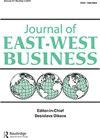危机后外国直接投资的(重振)作用
IF 0.9
Q4 BUSINESS
引用次数: 6
摘要
本期《东西方商业杂志》收录了第一卷公认的学术著作,这些著作响应了关于“全球金融和经济危机后欧盟的外国直接投资”的论文征集,并成功完成了双盲同行评审过程。呼吁提交文件的出发点是,一些国家没有从最近的多方面全球危机的破坏性后果中完全恢复过来。这场危机在2007年出现,当时是次级抵押贷款和能源危机(即2007-2008年的石油危机),并逐渐发展成金融、主权债务,最终导致战后经济史上前所未有的经济危机。在考虑到2015年(2014年外国直接投资)之前的宏观经济数据时,该呼吁强调,西方的经济复苏是脆弱的。虽然美国(危机爆发地)和大多数欧洲国家(危机对大多数经济体影响最大)的国内生产总值和外国直接投资有所恢复,但只有两个欧洲联盟国家的就业有所恢复,只有7个欧盟国家的固定投资额(固定资本形成总额)超过了危机爆发前的报告。美国在就业和固定投资方面也没有复苏。尽管2007年引发的全球金融和经济危机已于2010年上半年结束,但全面复苏仍有疑问。危机的影响在整个欧元区仍然可见,因为欧盟统计局的数据显示,几个成员国在GDP、固定资本形成和就业方面尚未完全恢复(欧盟统计局,未注明日期)。例如,到2017年底,六个欧盟成员国(即克罗地亚、塞浦路斯、芬兰、希腊、意大利和葡萄牙)的国内生产总值没有完全恢复(即超过了2009年危机爆发前2008年报告的数字)。14个欧盟成员国(即保加利亚、克罗地亚、丹麦、爱沙尼亚、塞浦路斯、芬兰、希腊、意大利、立陶宛、罗马尼亚、斯洛文尼亚、西班牙和葡萄牙)的固定资本形成总额没有完全恢复。截至2016年底,共有11个欧盟成员国(即奥地利、比利时、捷克共和国、德国,无定义本文章由计算机程序翻译,如有差异,请以英文原文为准。
The (Reinvigorating) Role of Foreign Direct Investment after the Crisis
This issue of the Journal of East–West Business contains the first volume of accepted scholarly work that responded to the call for papers on “Foreign direct investment in the European Union after the global financial and economic crisis” and completed successfully the double-blind peer review process. The initiation point of the call for papers was based on the fact that several countries did not fully recover from the devastating consequences of the recent multifaceted global crisis, which emerged in 2007 as a subprime mortgage and energy crisis (i.e., oil shock of 2007–2008) and gradually developed into a financial, sovereign-debt, and ultimately an economic crisis without precedent in post-war economic history. Under the consideration of macroeconomic data until 2015 (2014 for FDI), the call stressed that economic recovery in the West was fragile. While the United States (where the crisis commenced) and most European countries (where the crisis impacted the most economies) had recovered in terms of GDP and inward FDI, only two countries from the European Union (EU) had recovered in terms of employment and similarly, only seven EU countries had surpassed the amount of fixed investment (gross fixed capital formation) that was reported before they were hit by the crisis. The United States had also not recovered in terms of employment and fixed investment. Although the global financial and economic crisis triggered in 2007 has admittedly ended in the first half of 2010, full recovery is still in question. The impact of the crisis is still visible across the euro area as Eurostat data reveal that several members have not yet fully recovered in terms of GDP, fixed capital formation, and employment (Eurostat, n.d.). By the end of 2017 for example, six EU members (namely Croatia, Cyprus, Finland, Greece, Italy, and Portugal) did not fully recover in terms of GDP (i.e., surpassing the amount reported in 2008, before they were hit by the crisis in 2009). Fourteen EU members (namely Bulgaria, Croatia, Denmark, Estonia, Cyprus, Finland, Greece, Italy, Lithuania, Romania, Slovenia, Spain, and Portugal) did not fully recover in terms of gross fixed capital formation. By the end of 2016, eleven EU members (namely Austria, Belgium, the Czech Republic, Germany, none defined
求助全文
通过发布文献求助,成功后即可免费获取论文全文。
去求助
来源期刊

Journal of East-West Business
BUSINESS-
CiteScore
2.10
自引率
26.70%
发文量
19
期刊介绍:
Journal of East-West Business is a quarterly journal that deals with contemporary and emerging aspects of business studies, strategies, development, and practice as they relate to the Russian Federation, the new republics of the Commonwealth of Independent States, and Eastern/Central Europe-and business relationships with other countries of the world. The Journal of East-West Business is international in scope and treats business issues from comparative, cross-cultural, and cross-national perspectives. The journal features an Editorial Advisory Board that represents the Russian Federation, Eastern/Central European, and Baltic states in this new business arena.
 求助内容:
求助内容: 应助结果提醒方式:
应助结果提醒方式:


